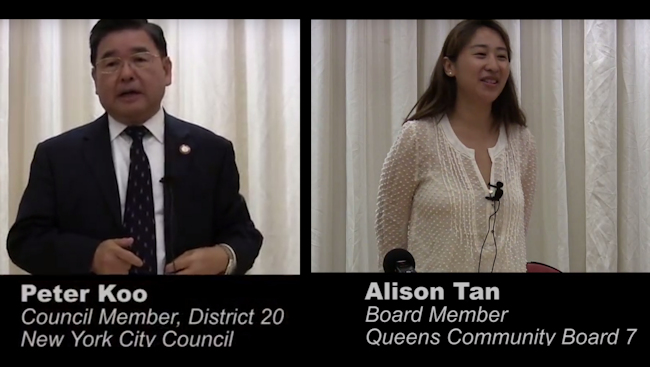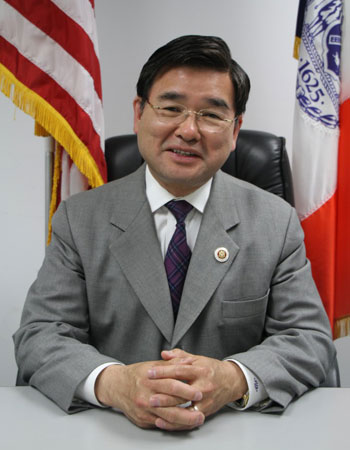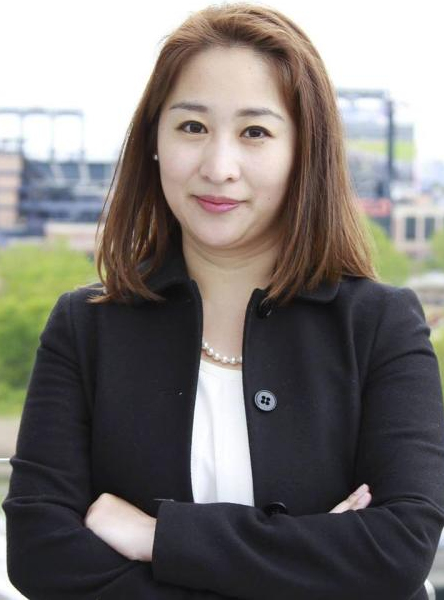
On September 12th, New York City’s registered Democrats will head to the polls for the Democratic primaries, and voters living in the city’s 20th City Council district – which includes downtown Flushing, Murray Hill, and Queensboro Hill – will be faced with a choice for the first time in eight years between two-term incumbent City Councilmember Peter Koo and challenger, Alison Tan. This race is of particular interest to Asian American New Yorkers: not only are more than 60% of District 20’s constituency Asian American, but issues within the purview of City Council – such as affordable housing, urban development, and public transportation – are of specific relevance to Flushing residents.
The contest between Koo and Tan has turned decidedly acrimonious in recent months: both candidates have drawn clear distinctions between one another with regard to policy, but the contest has also gotten deeply personal from both sides. Last week at a Candidate’s Forum organized by a coalition of New York-area Asian American groups, the personal attacks took a viciously sexist undertone as Councilmember Koo deployed both implied and overt assaults on Tan’s identity as a working woman, mother, and aspiring female politician.
The stakes for the District 20 City Council race could not be higher: for a district facing the looming consequences of rampant overcrowding, inadequate affordable housing, and a failing MTA, a strong, pro-active representative on New York City Council offers hope for a reprieve. Given the lopsided Democratic majority in District 20, the winner of September 12th’s Democratic primary will likely go on to win the general election later this year and become — or remain — the district’s representative on the New York City Council.

District 20’s sitting City Councilmember is Peter Koo, one of only two Asian Americans on the New York City Council. (The other is District 1’s Margaret S. Chin who currently faces her own competitive re-election race against two challengers.) Koo is a first-generation immigrant who worked minimum wage jobs in fast food to pay his way through college at the University of New Mexico, earning a bachelors’ degree in pharmacy. Koo went on to become the owner of a chain of pharmacies in downtown Flushing. He also cites over twenty years of community service with various groups including the Flushing Chinese Business Association, the Queens General Hospital Community Advisory, and the Flushing Lions Club. This long history of community service has led Koo to be dubbed the unofficial “mayor” of Flushing, a title Koo himself repeatedly refers to with pride. In 2008, Koo ran unsuccessfully for New York State Senate as a Republican before being appointed to the Queens Community Board 7, a local government advisory board. In 2009, Koo won the District 20 City Council seat as a Republican, winning 49% of the vote against Democrat Yen S. Chou. In 2012 – one year before he launched his successful 2013 reelection campaign – Koo switched his party affiliation to Democrat. As a City Councilmember, Koo currently sits on the Council’s Black, Latino/a and Asian Caucus, and he has received numerous endorsements reflecting his status as the institutional candidate, including most recently by the Detectives’ Endowment Association and the NYC Patrolmen’s Benevolent Association.

Koo faces stiff challenge from Alison Tan, a political newcomer who currently sits on the Queens Community Board 7. Tan is an investment banker and the former Managing Director for a real estate capital advisory firm; she is also the mother of two children and the wife of current New York State Assemblymember Ron Kim. Although she has not held publicly-elected office, Tan cites many years in community service, including as a member of a group commemorating a first responder lost on 9/11, as well as Dorot, a group that provides meals and other services for seniors. Tan has been endorsed by several groups, including most recently by Korean Americans for Political Advancement and by New York State Assemblymember Clyde Vanel, but she faces an uphill battle if she hopes to unseat Koo, who has institutional support from the mainstream New York City political machine.
The spectrum of gender rights has loomed large over the District 20 race since the outset. There are ample studies demonstrating that women and people of colour – never mind, women of colour – are significantly underrepresented in all branches of government. Relevant to the District 20 race, only 25% of New York City Councilmembers are women. If Tan wins, she will be the first Asian American woman to represent downtown Flushing on the New York City Council.
Meanwhile, Tan has hammered Koo on his record with regard to women’s rights. Specifically, she has questioned why Koo has granted over $25,000 in city funds to The Bridge to Life, Inc., a non-profit group whose 2012 funding application (which was approved by Koo) described its mission as to “do everything possible to encourage [pregnant women] to carry the child to term.” (Subsequent funding applications by the group have obscured the group’s status as a so-called “crisis pregnancy center”, which pro-choice groups have criticized for counseling women against abortion.) In July, a spokesperson for National Institute for Reproductive Health Action Fund PAC denounced Koo’s redirecting of public funding to the group, noting that Koo also voted against a 2010 bill that would have restricted such anti-choice pregnancy centers. Tan weighed in on the controversy, urging Koo in a letter to commit to directing an equal portion of city funds to pro-choice groups. In response, Koo said in a statement that while he is personally against abortion, he supports providing multiple services to pregnant women as part of their right to choose.
On August 20th, the issue of gender came to the fore in a heated District 20 Candidate’s Forum sponsored by APAVoice, a coalition of 18 Asian American groups. In that debate, Koo lobbed a series of attacks against Tan that rang an unmistakably sexist tone. Full video of that debate is available through the Asian American / Asian Research Institute (AAARI) YouTube channel.
Within five minutes of the debate’s opening, Councilmember Koo twice attacked Tan by critiquing her husband’s New York State Assembly voting record – as if Tan is both responsible for, and defined solely by, her spouse and his career. Later in the debate, Koo accused Tan of being too “aggressive” and for complaining too much – a highly charged dogwhistle towards sexist stereotypes of professional women, who are often described by men as loud and overly-confrontational. (In a study of sexism in tech, 84% of professional women reported that they had been criticized for being “too aggressive”.)
Perhaps most galling was an exchange between Koo and Tan at the 22-minute mark over the topic of a recent package of City Council bills that would increase the cost of cigarettes and would ban tobacco sales in pharmacies — an effort backed by Mayor Bill de Blasio to encourage New Yorkers to quit smoking. Koo has critiqued the measures, saying that the proposals unfairly target pharmacies when cigarettes can also be illegally purchased on the streets, and he formally abstained from voting on the measure. In last week’s Candidate Forum, Koo further stated that he had been advised by lawyers not to take a stance on the issue, since the fact that he owns several pharmacies that sell cigarettes presents a conflict of interest. Tan was quick to seize on this point, noting that she unequivocally supports the regulation while citing her own grandmother’s passing from lung cancer.
Koo responded with the apparently totally unfounded accusation that Tan is a heavy smoker and therefore a bad mother whose supposed smoking habit is literally killing her children.
Koo: I offer my condolences that your grandmother died of lung cancer.
Tan: Thank you.
Koo: But, if your grandmother died of lung cancer, why do you smoke? You’re a heavy smoker yourself! [audience explodes in both cheering and booing] You produce so much second-hand smoke for your babies. How can you do it?!? How can you do that?!?
(Koo goes on to say that he does not believe that the government should place regulations on the sales of harmful products such as tobacco, alcohol, or sugary drinks, stating that he believes that people have the right to choose to purchase such items. Of course the issue at hand is not consumer freedom in general, but whether such sales belong in pharmacies – which supporters of the bill believe should focus on selling customers life-saving medicine rather than poisonous carcinogens.)
Koo’s attack is overtly sexist: it not only accuses Tan of being (literally) an abusive mother who causes physical harm to her children, but he also dogwhistles that Tan’s place as a woman is as a caregiver to her children rather than on the campaign trail seeking elected office. Sexist attacks that portray female politicians as bad mothers are so commonplace that their use has ranged from the Right’s attacks against Wendy Davis to the Far Left’s attacks against Hillary Clinton.
Koo’s accusation also appears to be largely unfounded. Koo’s charges against Tan rely entirely upon a single 2009 picture that Koo’s campaign staff dug up from Tan’s personal (and private) Facebook page. That image – which had been set to only be displayed to Tan’s Facebook friends — shows a much younger Tan holding a lit cigarette in 2009 while attending a social event. The picture coincides with a time in Tan’s life when Tan says she was a social smoker, and that she quit smoking upon her grandmother’s death. Nonetheless, Koo’s campaign has taken that image and others of Tan at the same event, and circulated it to media without Tan’s permission. Koo’s campaign has also cited this 2009 image as their ‘evidence’ that Tan is not only still a smoker, but a “heavy smoker”.
Tan thoroughly denies that she smokes. And frankly, the entire line of accusation would be laughable, were it not for the fact that a woman once more not being taken at her own word about her own body is so wildly sexist.
When I reached out to Tan for a comment on the sexist timbre of the attacks being lodged against her, she described them as “jarring”, but also an “all too familiar” attempt to discredit a female politician by “undermining the validity of my voice and my seat at the debate.”
“At best, a woman is a good mother, and at worst, a bad one,” said Tan, describing the narrow stereotypes often faced by female politicians. “Those were the lines he drew for me.”
“[Koo’s] intent was clear – to use the double standards held particularly against Asian women, to discredit my character,” said Tan. “As Asian American women, we experience this crushing weight of the glass ceiling in all professions. In politics, where attacks are accepted by profession, the ceiling feels more like concrete than glass. When the very characteristics that would make anyone successful in public office – being assertive, loud and clear, bold, brave, outspoken – are the same ones used to criticize women, we clearly see why so few women are in politics at all.”
It should go without saying that sexism has no place in a political debate. Indeed, Tan proved her mettle in the face of these sexist attacks with a biting response (fast forward to the 30:30 mark if it doesn’t start from there automatically).
Meanwhile, the personal attacks between Koo and Tan threaten to overshadow the important issues facing Flushing voters. And indeed, from a policy perspective alone, Koo offered several responses in last week’s debate that might give a progressive Democrat reason for concern.
Not only did Koo offer the aforementioned ‘consumer personal responsibility’ line of defense for his support of pharmacy tobacco sales, but — when questioned about what policies he might implement to improve the safety of the City’s homeless shelters — Koo also went on a confounding tirade where he accused Flushing’s homeless population of being panhandlers and scam artists.
In recent years, New York City’s homeless population has surged beyond the capacity of the city’s homeless shelters. Furthermore, studies have also shown that Asian Americans have the highest poverty rate in the City, and that they may be dependent upon resources that also serve the City’s homeless population. Despite these numbers, New York City’s homeless shelters remain unsafe, and some homeless people have said they would rather sleep on the streets than risk the physical violence of the City’s shelter system. Yet rather than to suggest more and better social services to help the City’s homeless, Koo instead urged his constituents to call the police on homeless people – a population that is, incidentally, predominantly Black and Latinx – so that they can be promptly removed and “dealt with” by NYPD. In other words, Koo’s response to helping the homeless population is to encourage their further criminalization.
Moreover, Koo offered an eyebrow-raising response on the issue of racial profiling and “Stop-and-Frisk”, a controversial policy allowing NYPD officers to detain and search anyone they felt like questioning. The policy led to disproportionate targeting of Black and Latinx citizens for police harassment, and it failed to uncover any evidence of a crime in 80-90% of stops. Koo offered a baffling response when questioned on his stance on the policy: he said that he supports “Stop-Ask-and-Frisk”, but not “Stop-and-Frisk”, which Koo insisted were two separate programs. Unfortunately, if there is any distinction between these two policies, someone might want to let Wikipedia know; in fact, “Stop-And-Frisk” and “Stop-Question-And-Frisk” are the same thing. The fact that Koo appears to not know this betrays how little he is aware of this (extremely important) New York City issue and the racial justice concerns raised. Furthermore, that Koo supports “Stop-(Ask)-and-Frisk” is a troubling indication that Koo thinks very little about preventing racial profiling, police harassment, and criminalization of New York’s Black and Latinx population.
All in all, APA Voices’ August 20th District 20 Candidate Forum was an eye-opening event that (despite the mudslinging) helped to reveal the candidates’ similarities and differences with regard to important public policy issues ranging from Asian language access to campaign finance to urban development. If anything, I and the staff at 3CreditScores.net wish that the contest could focus more on these issues.
The voters of Flushing deserve better. They deserve fewer personal attacks – and certainly far less sexism — between Koo and Tan, and more of a real debate on political topics of deep relevance to their day-to-day lives. I urge everyone – and in particular Democratic voters registered in City Council District 20 – to take an hour-and-a-half to watch the forum in its entirety, and learn about the two candidates vying to represent downtown Flushing and surrounding areas on the New York City Council.
Above all, please don’t forget to register to vote, and to turn out to the polls on September 12th for the Democratic primary in New York City.
